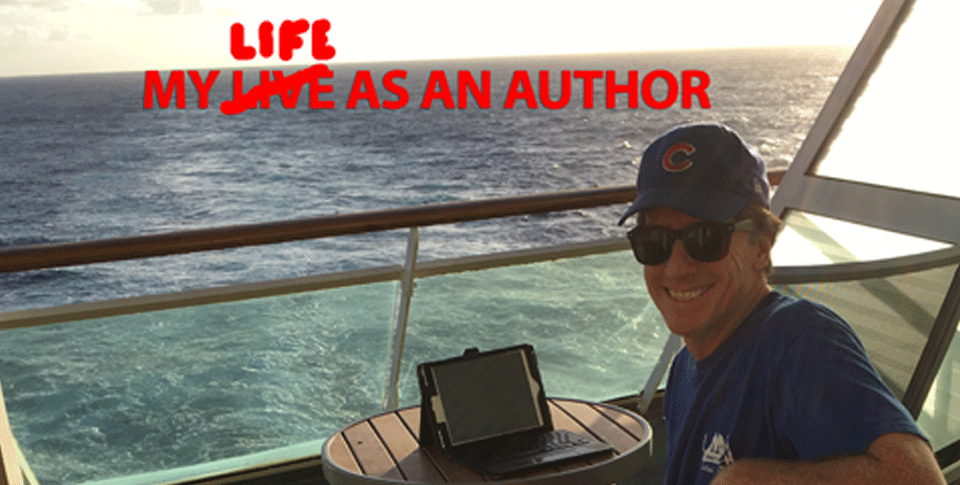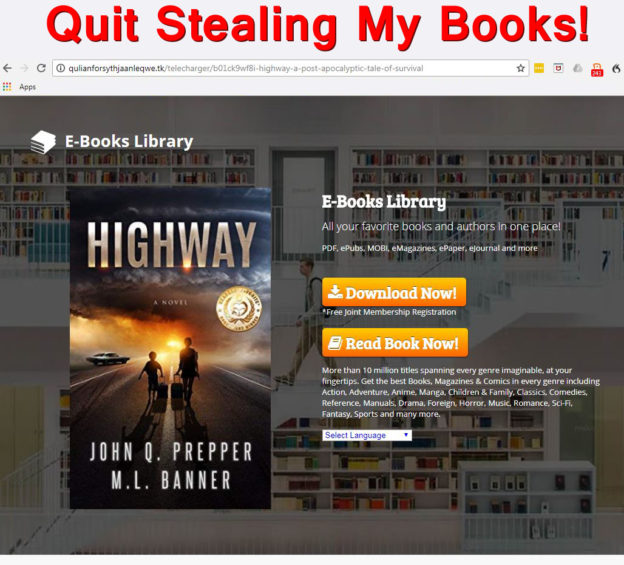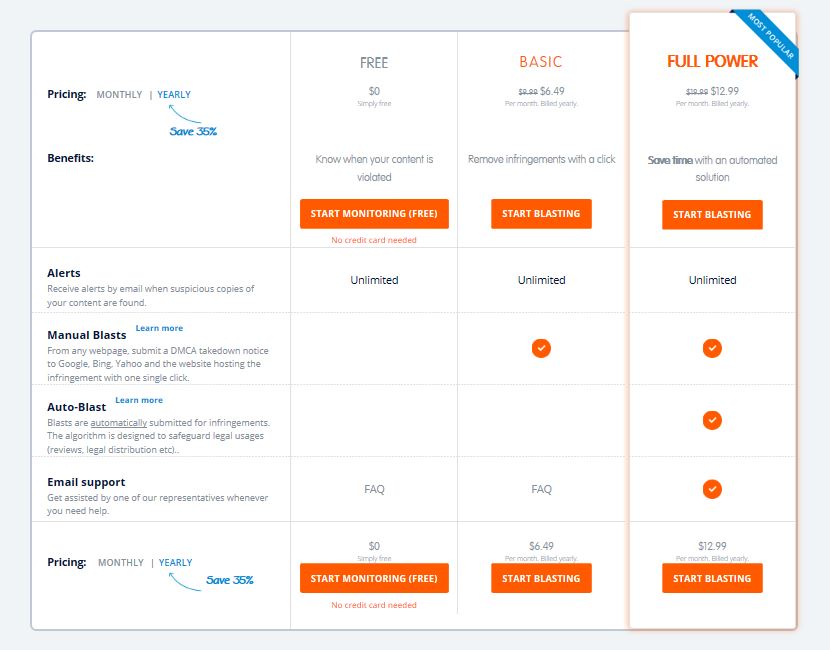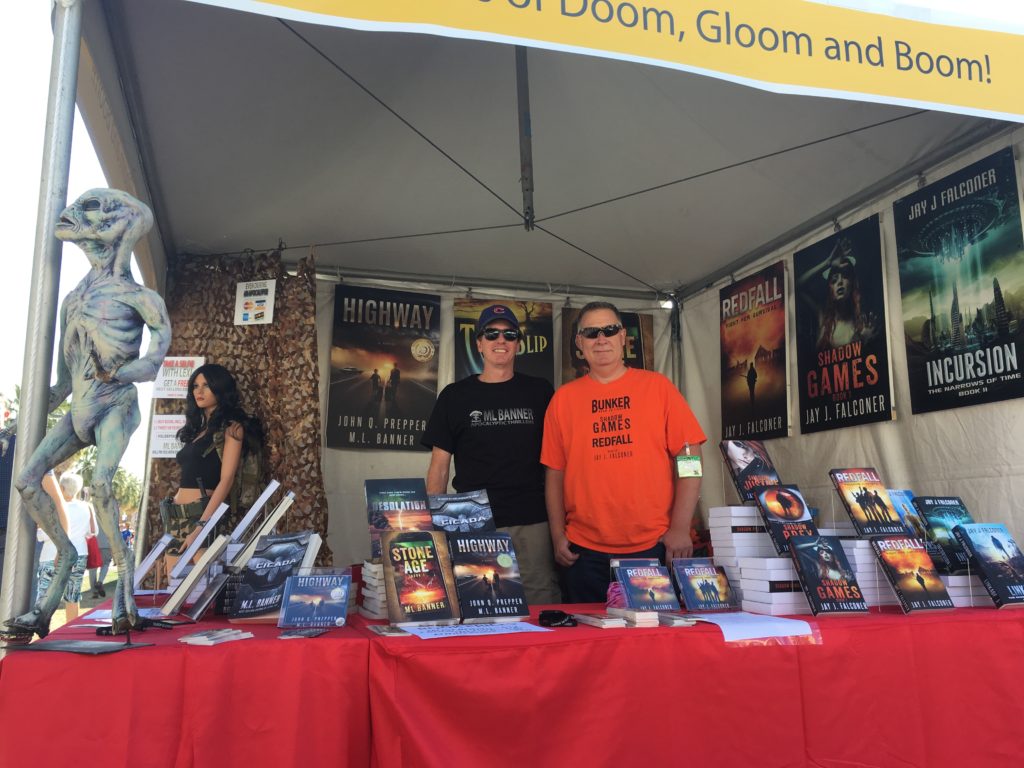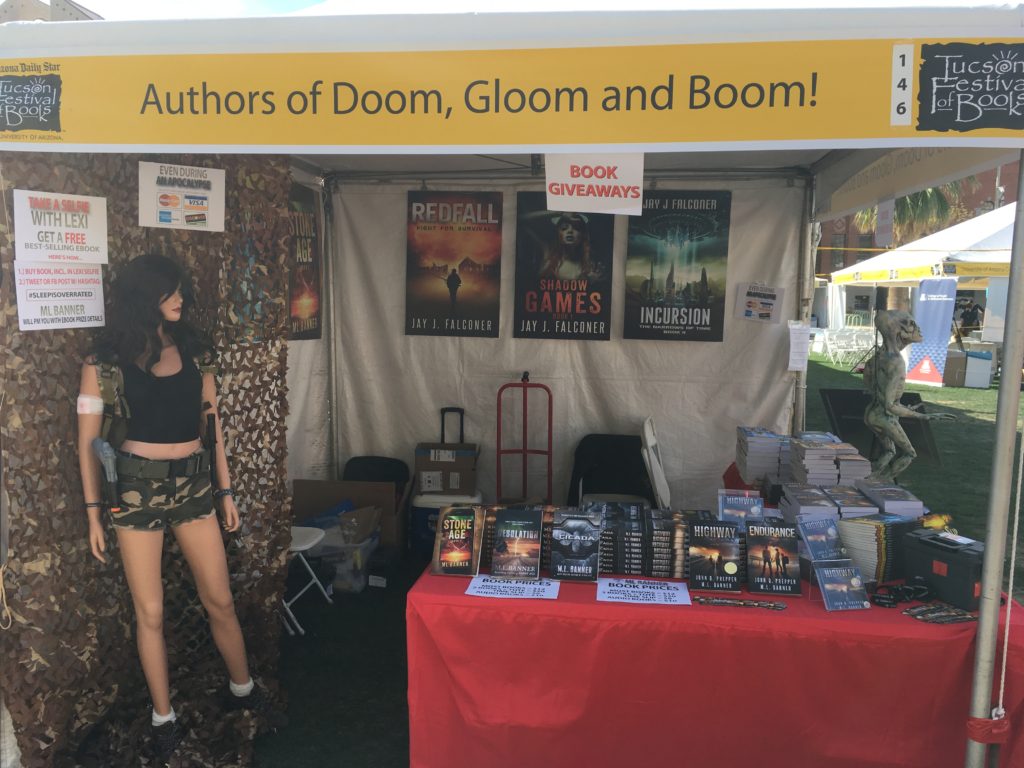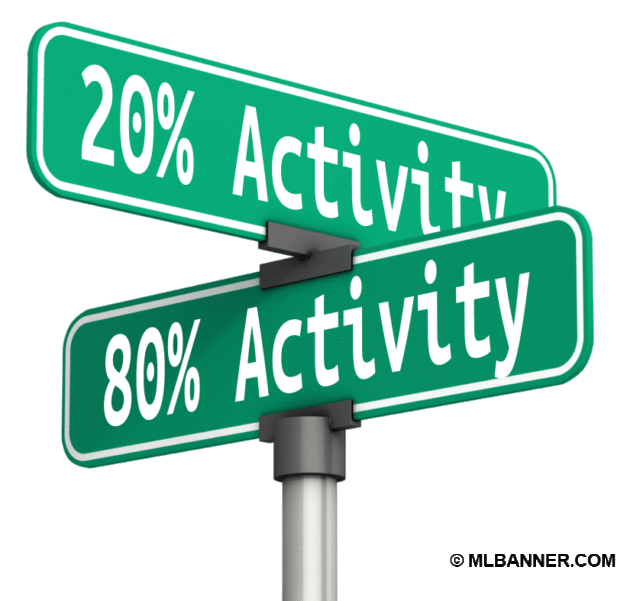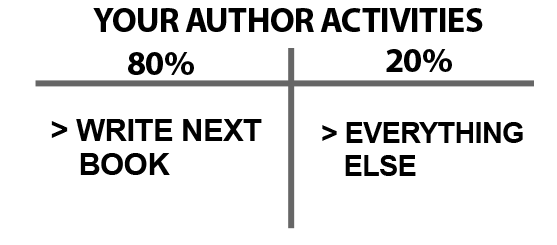A couple of years ago, a reader informed me that one of my books was listed for free on a website she’d found. She suspected fowl play and wanted to alert me of this. It sounded suspicious because, at the time, all of my books were on contract to appear exclusively on Amazon, and all were priced $2.99 or more. So I checked my reader’s lead.
It was true! Some website I had never heard about listed two of my books for free, without ever consulting me. To say I was incensed was putting it mildly. I was ready to spill blood. I sent the website a message via their contact form, telling them they were stealing from me. But I wasn’t done. I reported this theft to Google and then a myriad of other places. It also got me thinking, I did some searching and found my works on several other websites. I spent untold hours stressing and fomenting about this. I posted questions on author sites and FB Groups, asking what else I should do and what they’ve done in the past? The resounding answer was, “There’s nothing you can do, but ignore it.”
My favorite stitch of advice was, “Better to have your work stolen, then to be obscure!”
After all the time I spent on this and after I simmered down to a slow boil, I ended up accepting this motto, even adopting it as my own.
Then Blasty came along.
Like you, I get emails all the time regarding new products and services, targeted to authors like me. Some I open. Most I delete. Blasty was a new service that “monitors Google for illegal copies of your content and lets you remove them with one click!”
Yep, I opened this one. Best yet they were offering their service for free in beta mode. I’d beta-tested lots of services before, and this one intrigued me. So I went for it.
Months later, I am now a subscriber and even an affiliate of Blasty.co (NOT Blasty.com), because this service does everything they say, and more. PLEASE NOTE: If you sign up for their service and use the 10% off coupon I’ve list below, you will not only save money, but I will receive an Affiliate commission. Just wanted to be transparent.
So, you might ask, why do we authors even need a service like Blasty? The answer is simple.
If you’ve sold even one book on any major retailer, I guarantee you that your book has been stolen by someone. But who cares about one book, right? And you probably tell yourself that maybe that person will become a reader of your other books. Right? DON’T BET ON IT!
If you’ve sold a fair amount of books (like I have), your books (eBooks AND Audio) have definitely been stolen and are currently listed for free download on hundreds or perhaps THOUSANDS OF WEBSITES! And I will bet all my royalties against yours that this is true, right now.
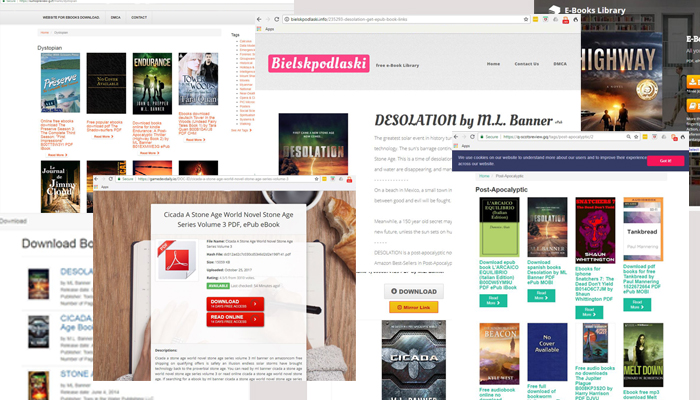
Think of how many readers are getting your hard work for free. And many of these readers will never buy a book from you, because they are of the type who assumes all content should be free.
Again, we’re talking tens of thousands of potential readers who will download your books for free, without any possibility of your receiving a royalty for any of your work, and they’re all available for download by a simple Google search. Are you good with that?
I wasn’t and that’s why I signed up for Blasty. Here’s how it works.
I get an email notification, like this one:
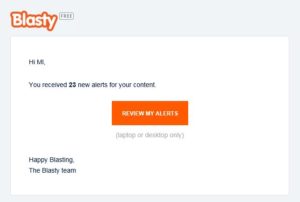
I also see them on my task bar and on my browser. I click on the link and I’m taken directly to Blasty’s website:
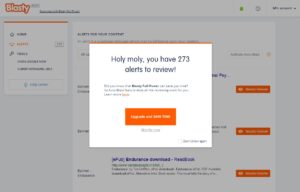
As you can see here, I had 273 alerts to review. That means there were at least 273 potential places on the web where my books were being illegally offered to the public for free. FYI, it had been about 20 days since the last time I had logged in and Blasted. Imagine how many sites would be out there after months… or years?
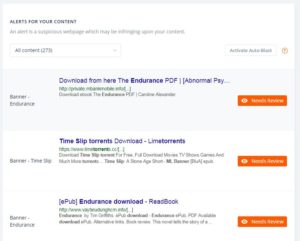
Each potential content violation is listed with a “Needs Review” button beside it. Just click on the first button and it opens up that offending website.
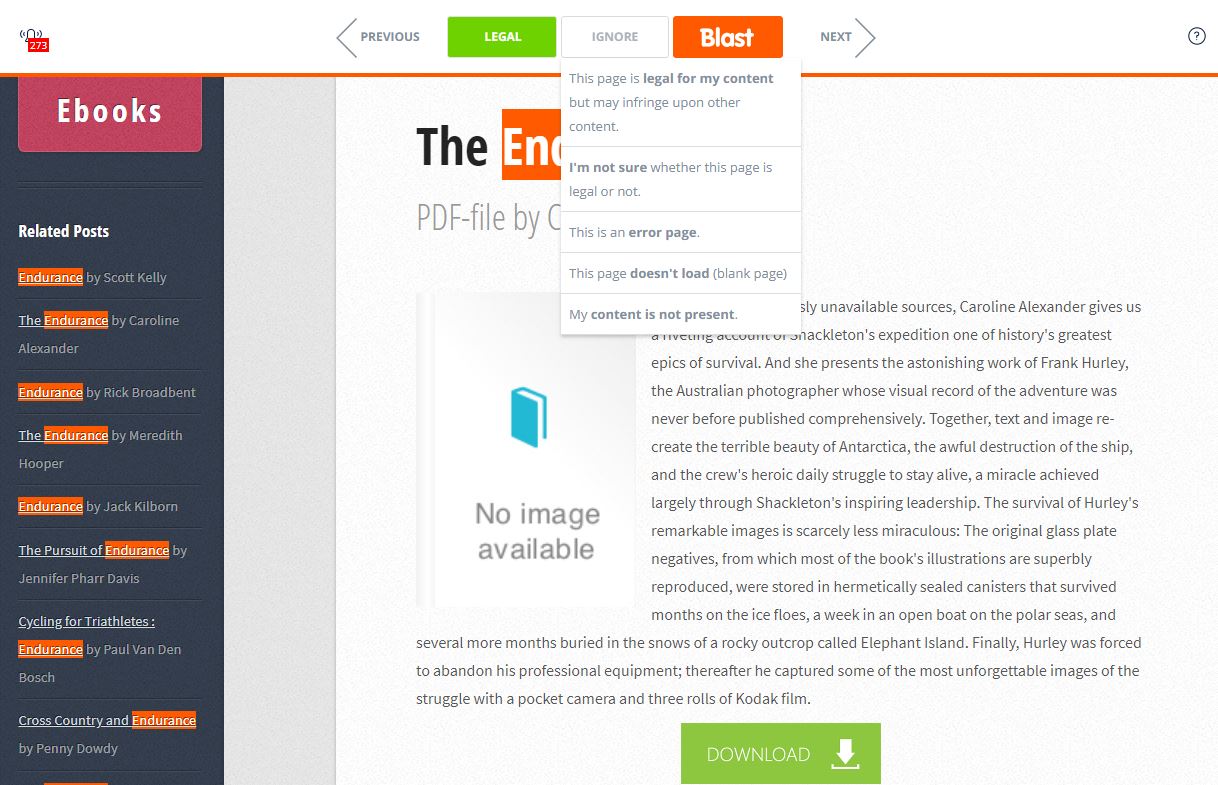
This is just one of the examples, where my book is listed for free download. After a quick review, I tell Blasty what to do with this page. If I wasn’t sure, or if it were a legit website (there weren’t any in this batch), I could click and choose one of the “IGNORE” options (which appear above the webpage). This example was easy, I clicked the control to “Blast” it!
What this means is Blasty will send a DMCA takedown notice to the service that hosts the offending website or the ISP of the violator, as well as removing it from search results. I believe this is for all search engines, in addition to Google (Blasty only mentions searching Google). Now if the offending website is on a server in the Ukraine, the page might still remain, but your average Joe won’t be able to find it again by doing a Google search for “Free Download [Your Book Name]”.
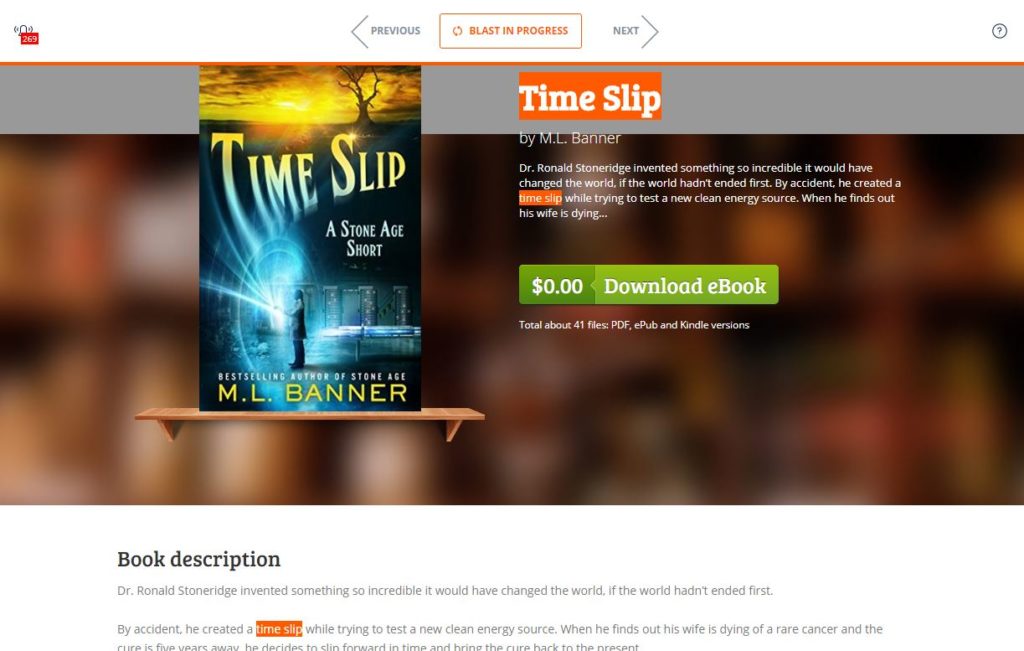
After I “Blast” that page, Blasty instantly tells me it’s now a “Blast in Progress” and I can click “NEXT>” to move onto the next offending website, where I’ll do the same thing with each one, until I’ve reached the end of my Alerts.
I won’t lie to you, going through 200+ websites that have blatantly stolen your books and then decided to offer them for free to their subscribers/viewers without ever asking you, does two things:
- It’s going to piss you off! It does to me every time.
- It can consume a lot of time. And that’s time spent on a 20% activity and not on writing. And that pisses me off too.
Because I’ve used this service a few times and am familiar with what shows up, I pretty much “Blast” everything now, I figure it takes me about 15 minutes to go through 100 alerts. These 273 took me about 40 minutes. But that’s about once per month. The good news is that Blasty has an automatic version that takes ZERO TIME. I plan to upgrade to this “Full Power” version in the next month or two.
So what does Blasty cost? Here’s their break-down from their website.
Last point. I asked Blasty for a discount code if I’d refer people to them. And they gave me one. Go here to get more info or to sign up (i.e. for the free trial): https://www.blasty.co/
If you sign up, use this code to get 10% off your subscription: MICHAELBANNERXBLASTY
At a minimum, try their monitoring service. It’s free. And you’ll see how many people are stealing your books. Then Blast them and get back to writing more books!
Let me know your experience with Blasty in your comments below.
